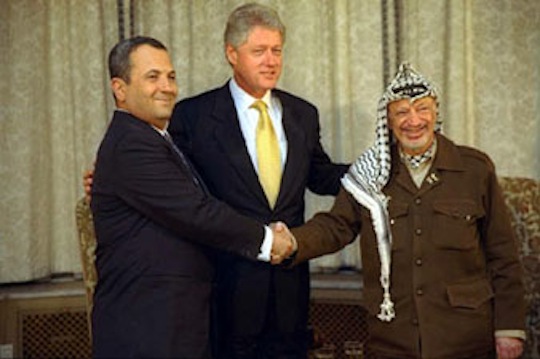Labor Party leader Isaac Herzog is channeling the same tropes and spin Ehud Barak used to destroy the peace process 15 years ago. Will we have to wait another decade and a half for him to admit what he’s done?
On a balmy evening in October of 2000, Ehud Barak, then the Israeli prime minister and Labor Party chairman, held a press conference in Tel Aviv where he made a rattling announcement that would leave its imprint on the Israeli establishment for years to come. Israel, he said, has no partner for peace.
It had been only several months since the Camp David peace talks came to a stuttering halt, and like every politician worth his salt, Barak realized that his political future depended on convincing the Israeli public he was not at fault for the failure of the talks. So he and his political advisors devised a mantra that would come to define the last decade and a half, and haunting the Israeli peace camp.
The spin worked, and for good reason. One week earlier, Palestinians in the occupied territories had launched the Second Intifada. Israel’s Palestinian citizens were taking to the streets en masse to protest in solidarity with those in the West Bank and Gaza. All of a sudden Barak, who defeated Benjamin Netanyahu in the 1999 elections and received a mandate to reach an “historical agreement” with Palestinian leader Yasser Arafat, found himself in a bind.
His government had collapsed even before the talks launched, and he knew he would be facing inevitable elections regardless of the talks’ success. While the “no partner” spin may not have been good for the future of peace talks — which resumed in various constellations after Camp David — or even in the general interest of the country, Barak saw it as his political lifejacket.
Israelis, for their part, had good reason to believe Barak. Deep distrust of Arafat coupled with a brewing uprising that would go on to become far deadlier than its predecessor undid much of what the peace camp had achieved over the previous decade during the heyday of the Oslo years.

Yet Barak’s insistence on turning dictum into common sense gave his “no partner” spin near-mythical powers, so much so that it essentially set the tone for successive Israeli governments over the next 15 years. From Ariel Sharon’s one-sided Gaza disengagement — Sharon’s top political advisor, Dov Weissglas, would famously admit that the disengagement supplied “the amount of formaldehyde necessary so that there will not be a political process with the Palestinians” — to Shelly Yacimovich’s insistence on speaking about the cost of living rather than the cost of occupation to the Netanyahu government of today, the Israeli consensus has been molded around the idea that conflict cannot be solved, it can only be managed.
Years later Barak’s top advisors would come to lament the role they played in creating that spin. As Peter Beinart notes in his book, The Crisis of Zionism, Barak aide Tal Ziberstein admitted that the “no-partner” campaign was one of the things he regretted most. Eldad Yaniv, Barak’s former campaign adviser and well known politico who has worked closely with politicians of all stripes added: “Ten years later, there are still people who say, ‘We gave them everything at Camp David and got nothing.’ That is a flagrant lie… I was one of the people behind this false and miserable spin. It may have been justified to a certain extent to stir the Palestinians to revive the negotiations, but it’s false.”
But by the time Barak’s aides came clean, it was too late. The death knell of the Israeli peace camp, whose entire raison d’être was to take part in negotiations in good faith with a Palestinian partner, had been sounded.
The “no partner” motto reverberates to this very day. Just weeks ago, Zionist Union Chairman Isaac “Buji” Herzog presented his party’s new diplomatic program at Tel Aviv’s Institute for National Security Studies. According to the plan, Israel would complete the separation barrier first erected by Ariel Sharon in the early 2000s, building it around existing settlement blocs so as to annex them to Israel. It would also give more autonomy to Palestinians in Areas A and B of the West Bank (Area A is under full control of the Palestinian Authority, Israel handles security control in Area B), and push off East Jerusalem neighborhoods such as Issawiya and Shuafat — which have been under Israeli control since 1967 — to the Palestinian Authority.

Herzog also criticized the Netanyahu’s government for being too soft on the Gaza Strip, where he claims the government is only bombing empty spaces rather than human beings.
“That is the kind of co-existence that is possible right now,” Herzog told the crowd, as if Zilberstein and Yaniv themselves wrote the speech. There is nothing “new” in Herzog’s vision — upon closer examination it looks to be the Netanyahu doctrine on steroids. More than that, however, it is reminder not only that the Israeli Left has never fully recovered from Barak’s self-sabotage, but that it has played a crucial role — perhaps just as crucial as the Right — in burying any chances for the two-state solution.
One couldn’t help but laugh along with Prime Minister Netanyahu last week when he mocked Herzog in the Knesset plenum: “Good morning Buji, I’m glad you have woken up. Good morning Labor, welcome to the Middle East. The alarm clock has rung and maybe you’re beginning to understand where we live.”
In some sense, one can chalk up Netanyahu’s seemingly endless grip on the premiership to the groundwork laid years ago by Herzog’s own party. Instead of proposing a real end to Israel’s military dictatorship in the West Bank, Herzog proposes a plan built on 15-year-old stilts made of spin that should have collapsed long ago. Instead of calling on his opposition to put up a fight against ethnic separation, Herzog and his party have doubled down and adopted the “no partner” adage in a cynical attempt to sway voters away from Netanyahu.
When it comes to received political wisdom, narrative nearly always wins over facts. But for those who believe Palestinians and Israelis can live in this land as equals, the truth is essential. And when our so-called leaders — the ones who call themselves “leftists” — try to convince us otherwise with spin and lies, it’s on us to fight back.



